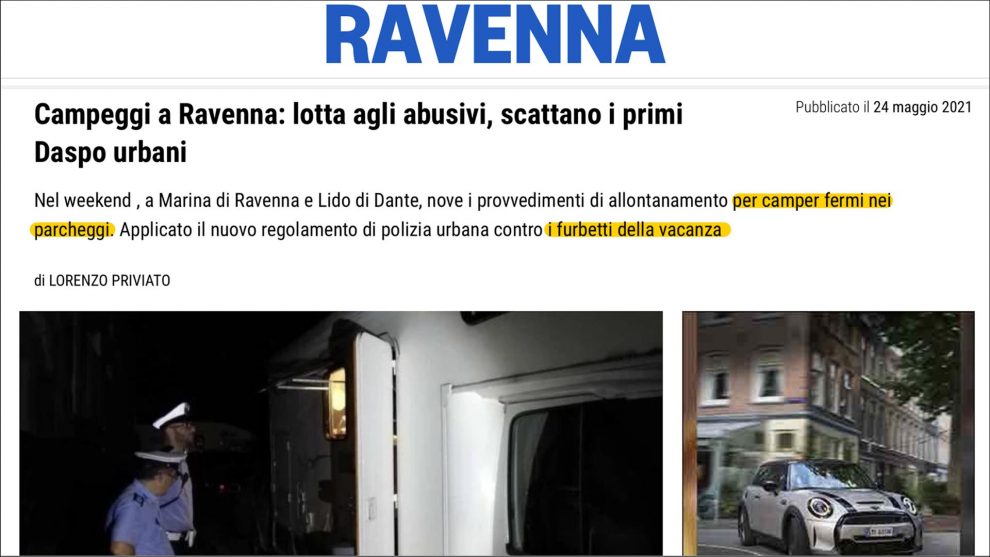Dear editor-in-chief Michele Brambilla, dear colleague Lorenzo Priviato,
I read with bewilderment the piece you published today on your website entitled “Campsites in Ravenna: fight against squatters, the first urban Daspo are taken“. Far from giving correct and impartial information (7 campers fined for breaking a semi-unknown urban police regulation that intends to prevent “activities similar to camping”), you have decided to use derogatory tones towards an entire category of tourists, demonstrating from on one hand a lack of knowledge of the phenomenon of itinerant tourism and on the other expressing a sort of “racism” towards those who, legitimately, have made a precise choice for their free time.
In particular, you spoke of a “sort of parasitic tourism“, made up of tourists who take “hit and run holidays that […] from an economic point of view bring little or nothing to the city“, defined as “crafty camping people” for whom “the era of the latching holiday seems to be over”. You also write that “on weekends they storm the shores, occupying parking lots for whole days“. But who goes to hotels and rented apartments, whether it’s for a weekend, a week or a month, where does he put his car? Do they all have a private garage?
Given the tones you have used, perhaps it is better that you know some data. Recreational vehicles in Europe are about 5,700,000 and are used by “crews” ranging on average from two to four people. We are therefore talking about millions of people who choose this type of holiday, and for whom Italy is one of the top-3 European markets.
They are people who have bought vehicles with prices ranging from 40/45 thousand euros to 100,000 (leaving out the luxury products that can cost several hundred thousand euros). It is a tourism that loves freedom, contact with nature, cultural routes, food and wine and sustainability. Of course, sometimes these people eat in a motorhome (perhaps products purchased in local shops), other times they go to restaurants, almost always buy tickets for cultural or recreational attractions, spend the day in the beaches, buy newspapers, drink coffee and/or aperitifs in the bars in the area, they pay for parking. It is not a poor or second-class tourism. They are simply people who do not go to a tourist resort and stay there for one, two or three weeks: they prefer to broaden their horizons.
But they spend and contribute to the local economy, as evidenced also by the Table for Outdoor Tourism. Can they therefore be defined as parasites, cunning, freeloaders? I really think not.
As in every segment of civil society, even among campers there can be people with more limited economic resources (whose only “fault” is to spend less) and perhaps rude characters can lurk, sometimes even a lot, who do not respect the rules nor the common sense of civil coexistence. Yes, these must be sanctioned, but when it comes to these episodes, we must be careful, journalistically speaking, not to criminalize or insult an entire category. Reading the urban police regulation you cited, it is clear the intention to strike only those who carry out “activities similar to camping” and for this reason I believe the seven campers mentioned in your article have been fined.
If this were not the case and the tourists were fined exclusively because “They had stopped their motorhomes in the stalls for cars, staying there all night, sleeping and eating inside, aware of the fact that the Traffic Laws allows them“, as you wrote in openness, they would have every right to appeal (and they would almost certainly win it). In fact, municipalities can ban camping (the real one, not what looks like camping based on unknown criteria), but not parking. And while parked, people inside the vehicle can use it for what it was produced for, naturally in compliance with national regulations.
Respect that should also exist in the opposite sense, on your part towards tourists, and possibly also on the part of local authorities who can make mistakes when they try to combat unwanted phenomena.
These reflections of mine want to be an open letter that can serve as a stimulus and comparison for all the players involved in the world of tourism, from those involved in hospitality to local administrations, from those who provide information to those who must enforce the rules. For this, I publish these notes also on the blog Seimetri.it and on the related social profiles.
Sincerely
Paolo Galvani
©2021 seimetri.it – If you want to leave a comment on this article, you can do it on our Facebook page
























